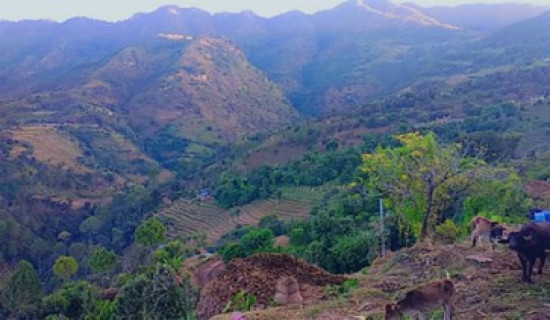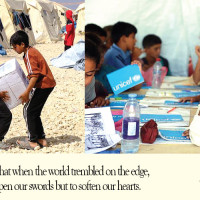- Saturday, 23 August 2025
Robin Tamang: A Nepali rock legend
By Mannu Shahi, A paradigm of musicality, style and vehement, Robin Tamang was one heck of a front person for two legendary acts redefining the soundscape of the late 90s to early 2000s Nepali rock. The scene slowly shifting from aadhunik to modern influences was astounded by a blues-rock singer with immense exposure and an apt for astute songwriting.
With Looza, the singer captivated a mass following for their unmatched band chemistry and the series of evergreen tunes they manifested as a group. However, after the dismissal of Looza, many of their followers hesitated to give The New Revolution a chance. Still, time proved things otherwise as the new group also comprised thoughtfully handpicked members who were just as crucial in fabricating this legitly glorified sound palate.
Born in Singapore on April 17, 1963, to a family serving in the British Army, Robin Tamang spent his childhood and youth years in Hong Kong, Singapore, Brunei and Canada. This gave him much-needed exposure to Western pop culture, which was considered a scarce asset for artists existing in a pre-accessible-internet world. His return to Nepal in 1996 led him to connect with the young, talented and driven accompanying band Looza, who were just as smitten to collaborate with this promising rocker encompassing prior experiences of leading two abroad-based bands: F Troop and Tamang.
Their discography consists of three albums together with the 1998 debut “Nepal” comprising of blues rock renditions of popular Nepali tunes, English originals and the title track being the only original in Nepali vernacular. Their 2000s’ sophomore “Adhunik Aaganama” was more dynamic, profound and explorative with fusion, reggae and pop rock elements and the third entry 2001’s “Bhool Ma Bhulyo” was the group’s most commercially acclaimed venture comprehending more experimental structures and influences with six Nepali originals out of eleven.
The inevitable end of an era marked by the news of Robin N' Looza's separation in 2005, and, a year later, the singer aligned with new friends to publish his fourth studio album “Keta Keti” under the moniker Robin And The New Revolution. An anti-consumerist anthem, the title track deems to be one of my personal favourites not just for its lyrical content, which is the nucleus of the entire package, but also for the flow of melodic phrasings, authenticity and the timeframe of its publication.
Similarly, ‘Kalpana’ with its hopeful plea and ‘Ekta’ a patriotic tune, both showcase the singer’s intense and contemplative songwriting abilities; additionally, the band’s arrangement approach and coordination also ornaments the tunes incredibly.
Furthermore, RATNR released three other albums with a few changes in their line-up “Hamro Desh” (2010), “13, 000” (2011) and “Muglan” (2019). With their new group of members, the band was actively playing live shows, their latest being The Big 4 Festival Volume 2 held on April 14, 2023, at Purple Haze, Thamel.
However, after the shocking demise of the legendary 60-year-old rockstar last Tuesday, July 4, the Nepali music fraternity has transcended into a mournful state reminiscing Tamang through his creations, acknowledging his contributions and expressing their heartfelt condolences and prayers for his departed soul.
Robin Tamang’s funeral ceremony will be held at 11:45 AM today in Swoyambhu for an intimate gathering of his family members and close friends. For anyone else with desires to pay their final respects, a condolence ceremony from 8 to 11 AM will commemorate at Nepal Academy of Music & Drama, Naxal, today, July 9, Sunday. A truly great loss for Nepali rock music!
















